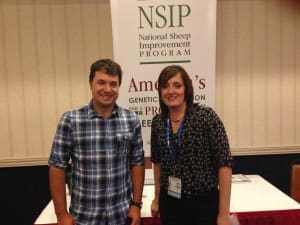
Australia’s Tri-Lamb youth program member Jamie Heinrich from Kangroo island with Lesa Eidman, Sacramento, California, at the ASI convention.
Kangaroo Island sheep producer Jamie Heinrich is helping to lead a three-country youth initiative to promote lamb in the American market.
The Sheepmeat Council of Australia selected the 26-year-old producer to be Australia’s founding member on the Tri-Lamb group youth group program, to grow consumption of lamb with US and New Zealand partners in the American market and collaborate on common production issues.
The Tri Lamb Group comprises the peak sheep meat ranching organisations from Australia (Sheepmeat Council of Australia (SCA)), United States (American Sheep Industry Association), and New Zealand (Beef & Lamb New Zealand). They met together in Reno, Nevada on January 27 during the American Sheep Industry’s annual convention.
Tri-Lamb commitment re-affirmed
At the meeting producer leaders reaffirmed their commitment to a collaborative marketing program in the United States that seeks to grow consumer demand for lamb through increased awareness of its nutritional benefits.
SCA president Jeff Murray said it was great to have new initiatives from the group come forward.
“We have many common interest areas outside of marketing. By collaborating we can help ensure a profitable long-term future for sheep producers in all three countries.
“One of the most exciting developments was agreement to engage young ranchers and producers in the program.”
Social media to be new Tri-Lamb focus
Jamie said the focus of this year’s Tri-Lamb program to further increase lamb’s presence on social media platforms, amongst nutritionists and dietitians, and with lamb suppliers and retailers, was a great move. He uses Twitter, Facebook, Instagram and SnapChat
“From my age group’s perspective it is great move – everyone is one social media and it’s a cheaper option of marketing.”
“Participating in the TriLamb meeting was an invaluable experience for me,” he said.
“I have learnt a lot about the issues that US ranchers are facing, with many similar to those faced by Australian producers.
“I have had experience working on-farm and in the processing sector,” Jamie said.
“This opportunity allowed me to see the other end of the supply chain and gain knowledge about the factors which influence our markets.”
“I am keen to continue working with SCA and the TriLamb group to share knowledge and ideas which will not only help me, but also the future of the Australian and global sheep industries.”
Aussie lamb welcome in US
Jamie said most of the young farmers he spoke to welcomed Australian lamb and were appreciative of the country’s input on marketing and research.
“The biggest opportunity over there is growth in the market – just pushing lamb itself — because it is such a big market and such a small percentage of it I lamb at the moment.”
Mr Murray said the Tri-Lamb group was established in 2004 and has been important in building and maintaining relationships with our US counterparts.
“The US continues to be an important export market for Australia, taking 59,947 tonnes in 2014, and we want to continue to work collaboratively to grow consumer demand for lamb.”
Mr Murray said Jamie brought a lot of enthusiasm to the meeting and sparked the interest to have more young producers involved.
New Zealanders find common interest in drought
B+LNZ’s Central South Island director Anne Munro attended the annual Tri-Lamb Group conference in Nevada with B+LNZ’s North America manager Terry Meikle and Federated Farmers’ meat & fibre industry group chairperson Rick Powdrell.
“Building better relationships with the likes of the Sheepmeat Council of Australia and the American Sheep Industry Association helps us understand the viewpoints of sheep farmers from other countries and to learn from them.
“For example, this year we talked a lot about how sheep farmers in each of our countries deal with droughts – something that is obviously relevant for Kiwi sheep farmers right now,” Ms Munro said.
The Tri-Lamb Group also resolved to work more closely in areas of common interest, including:
- Communication strategies to engage with consumers to build community support through increasing understanding of the passion, commitment and professionalism exhibited by lamb producers in all three countries.
- Collaboration on research and education activities to address the impact of predation on lambs in each country by wildlife and feral animals, such as coyotes, wolves, wild dogs and pigs.
Sources: Sheepmeat Council of Austrlia, Beef+Lamb New Zealand



HAVE YOUR SAY